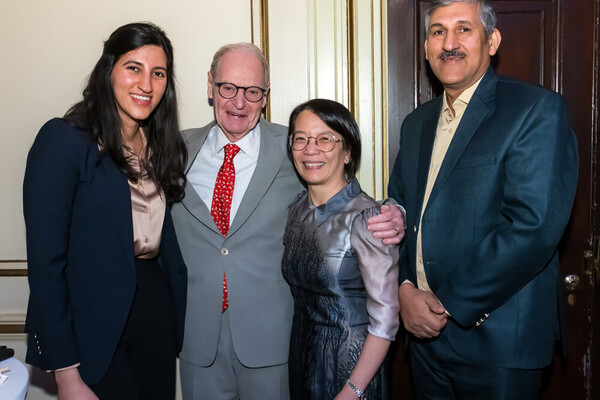Mobile Menu
- Education
- Research
-
Students
- High School Outreach
- Undergraduate & Beyond: Community of Support
- Current Students
- Faculty & Staff
- Alumni
- News & Events
- Giving
- About

A venerable guide on how to stay well and excel during medical training, by University of Toronto professor Allan Peterkin, has been updated to reflect the practice of medicine in 2024.
Staying Human During Residency Training — first written by Peterkin as a resident and now co-authored with University of Ottawa professor Derek Puddester — offers timely advice for learners in an era of virtual medicine, COVID-19 and culturally sensitive health care.
“After writing the first six editions on my own, and now approaching retirement, I wanted a powerful final edition,” said Peterkin, a professor of psychiatry and family medicine at U of T’s Temerty Faculty of Medicine, and senior clinician scientist at Sinai Health.
“Derek is an expert on wellness and leadership, and was able to bring new eyes to our review of each chapter,” Peterkin said. “We needed that because the face of medicine has changed — it’s no longer such a white, patriarchal discipline — and because COVID-19, technology other changes have altered medical practice.”
Key updates include new content on equity, diversity and inclusion.
“I would say EDI is the biggest addition,” said Puddester, who is also a psychiatrist and former director of the faculty wellness program at U of O’s faculty of medicine. “We poured energy into a review of EDI literature, and reached out to communities of practice across Canada and the U.S. to learn what they wanted in the book.”
Other updates include tips and insights on key trends in resident stress, patient advocacy, and legal and ethical challenges such as medical assistance in dying, as well as advice on when and how to use social media.
The authors preserved much of the book’s prior content, including advice on self-care and time management, financial principles, and how to cultivate personal and professional relationships.
Puddester said he was glad that core material still anchors the book — in part because it helped him get through his first year of residency in the 1990s, after coming to Ontario from his home in Newfoundland.
“We had brutal call schedules, and there wasn’t much learning. We felt like slaves,” Puddester said. “But then I read this book, with incredibly practical words on sleep, nutrition and other ways to be healthy. It left a real imprint on me.”
Puddester said those details on self-care have become a big part of his ongoing work in wellness, and that the material is as important today as ever, given new stressors on clinicians such as workforce shortages and COVID-19.
Peterkin echoed those concerns, which he said have loomed large in his recent work with Temerty Medicine’s narrative-based medicine lab, which offers arts-based programs for clinicians. “It’s been such a difficult time coming out of the pandemic, burnout levels are high, and a lot of us want to talk about renewal and how to reconnect with our work.”
Mindfulness, a focus on narrative and arts-based learning all offer practitioners a way back to meaning in work and life, Peterkin said. “The pandemic was a reminder that to be happy as humans, we need pleasure and purpose. And we need to redefine those over time.”
For Peterkin, writing is part of that redefinition process, which he said will continue beyond his retirement. He has authored 16 books for adults and children, as well as short fiction, poetry, essays and textbooks, and he plans to write another picture book next.
“I like to be captivated by projects, in medicine and writing, and I’ve found those two streams complementary,” Peterkin said. “Doctoring demands that we bear witness to individual suffering, receive a story and reflect on it. Writing facilitates all that, and prevents medicine from being rote.”
The seventh edition of Staying Human During Residency Training is available through University of Toronto Press, as a paperback or ebook.

